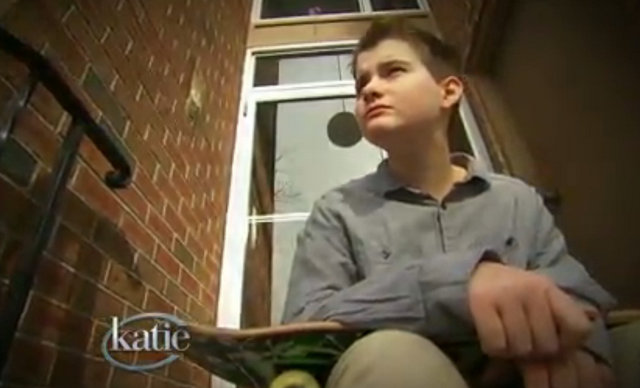On February 26th, Katie Couric’s daytime TV talk show Katie, aired “Growing Up Transgender,” a segment focusing on the experience of trans children and their parents. You can watch it on the show’s website.

Those of us who are trans*, or otherwise immersed in trans* issues, may feel tense as early in this article as “daytime TV,” knowing how often media fails to portray us as anything but troubling curiosities. And even grim curiosity seems like a relatively new development, the days of shocking Jerry Springer dating exposes not far behind. Portrayals of transgender children often manifest both progress and backlash, representing at once the increased awareness and acceptance needed to detect and treat gender dysphoria early, sincere efforts to understand trans as a thing experienced and expressed by human beings, the cultural obsession with youth as subjects of enchantment and intense concern, and brazen attempts to profit from all of the above.
When I was asked to write about this episode of Katie, I was ecstatic – that is, until I realized that I needed to catch a broadcast TV show in the middle of a Tuesday. I work in a hospital, and could hijack a waiting area if it wouldn’t mean being a surly Amazonian watching a potentially nauseating presentation on My People in a room full of strangers, some there on the worst day of their entire lives. After a few hours of frantic hunting, Couric’s Facebook people put me out of my misery and confirmed that they’d stream the episode later that night.
The web presentation is a slightly different experience. Each segment is broken up by a quote, twitter excerpt, or explanatory blurb. A column on the right tempts you with related stories. This is where we find our first problem: wrong body wrong body wrong sex, slapped over the layout like a flagellant’s mantra. Phrases like “born in the wrong body” upset trans people. They are first a shibboleth of the Sensational Gender Deviance Story, a phrase calculated to attract cis people who find trans* shocking, mysterious, and exotic. The problem is that we’re essentially right here with you in the room, so to speak, and not trapped behind glass like the human mermaid at a sideshow. Explaining this to cis people can be frustrating, because it’s never really happened to them. They get to be normal, and what could be more normal than innocent, excited curiosity?
The danger of these clichés is they build up the idea that we have a cookie-cutter narrative. Sure, I’ve felt “trapped in my body” before, and gosh that was horrible, but other trans people understand their feelings in very different ways. Many people who are not trans are surprised to learn of how strictly our allowable stories have been or are policed – how in many circles we must either report a narrow range of feelings that appeal to the clinician’s sexist and subjective idea of what The Transgender Story is or be denied medical care that we need to survive. Imagine you’re in the ER with a gaping chest wound, but will only get treatment if you describe the pain as “stinging” – if you say “burning” or “dull,” you’re a faker pervert and it’s out the door with you. The notion that I must feel a certain way about my childhood actually prompted me to declare it a no-go zone. I refused to really analyze it until well after I’d begun living full-time “as a woman” and no one could stop me for thinking the wrong way. It’s a sore point, and something I can’t help but be on guard for.
There’s more to talk about before I clicked the first “play” button. Giant type reveals the strange and terrifying questions asked by gender-dysphoric youth, punch-out links ask: what would you do?, and the great sage Chaz Bono is summarily credited with the phrase “gender is between the ears and not between the legs,” as though no one had thought to say such a thing until the year of our Lord two thousand and eight. There is one high point – the first paragraph does establish that clothes are not gender, and trans kids don’t simply want to wear fancy dresses or ride the big wheel. This is more than a lot of people seem to understand. Time for the actual segment, yeah?

The first participant, Coy, is introduced through a brief play montage remarking on her transition. The whole “playing with girl toys” thing is tough to watch. Remember that bit about having a narrative forced on you? But, for children, it’s probably hard to avoid. That’s what kids do, they play, and they do find themselves in a stratified, gendered environment from day one. With the montage finished, I find myself more at ease as Couric interviews Coy’s parents. I find myself liking them, and thinking that they treat their child with seriousness, warmth, and respect. As the four discuss Coy’s rejection by her school and the family’s pending legal action, they are unwavering in their support. Whatever I might feel about this segment, it’s clear whose side Couric feels she is on: mine.
Of course, wanting to be a good ally and realizing that quality can be very different things. Both Couric and the family attorney attempt to seriously address the feelings of parents who are uncomfortable knowing their child may share a toilet with A Transgender, with one of Them. Obviously, I think this was a mistake. It’s a pearl-clutching question: yeah, they seem nice, but would you let one pee with your sister? The facile, bigoted nature of these complaints is made clear in this CNN article about the lawsuit. Claims that discomfort is natural and sensible as Coy’s “male genitalia develop” are uncritically parroted here as if puberty blockers and HRT were not in play and the bathroom were a place where everyone throws their genitals around. Or perhaps not everyone, but we’re made to understand that a freak would.
That’s the sort of filth you only legitimize by engaging. Attack it or ignore it, don’t tell me “It’s a difficult situation for everyone.” It’s a difficult situation for a child who finds that her ordinary bodily functions are suddenly everyone’s business. I understand that overcoming your own prejudice can be difficult and uncomfortable, and I do not care. It is not my problem. It is not a child’s problem. That’s why there’s only one right answer – fuck you! Tell YOUR kid to use the staff bathroom if you’ve got a problem.
On to segment two, and our first expert, Andrew Solomon. Trans 101 starts well enough, if along gender binary lines. The question of how children can possibly know then sends us into dangerous territory: the Expert Andrew Solomon opines, well, there are children with cross gender affiliation who aren’t really trans so it’s all a bit of guesswork (verbatim, jovial.) Couric intensifies. “Didn’t Kinsey say that everyone’s a little gay?!” I see red and take a short time-out.
Solomon does impress me on one point – he advocates what to some would be unthinkable, that is, permitting children to transition in a reversible capacity and seeing what happens. It’s hard to overstate what a big deal that is. It’s a huge benefit to dysphoric kids, and it can be very conclusive for others (who might otherwise obstruct these children) to see the effect of even some relief on a person’s happiness. Solomon and Couric sour my mood with another quick back-and-forth on how confusing trans is, but key points are made – rejecting and obstructing trans people has lethal consequences. At no point is this presented to the audiences as a novelty. It’s serious and sad, just how I like my coffee and just as it should be.
I’m caught by the web copy again as I scroll towards Couric’s interview with Devon, 19. If this Palin-botherer thinks she’s the first to introduce a trans woman as a pretty girl with a HUGE SECRET, I’ve got a bridge to sell you in Alaska. Foreshadowing serves us well, and Couric can’t help but ask how many boys she’s scared off, you know, with that. The Surprise.
I need to get very real here. That is not an okay thing to ask, and that’s not an okay way to ask it. Dating men means living with a risk of brutal, unprovoked sexual violence if you don’t have a penis. Trans women have a staggeringly high risk of being murdered by an intimate male partner. Just the other day, I saw a woman trying to raise money for SRS who explained that apart from all the typically understood reasons for pursuing surgery, she fears it would make the difference between surviving a sexual assault and being tortured to death. That’s the battlefield we’re on and the sort of logic we find ourselves living with. How can you joke about something so heartbreaking and deadly?
Couric continues, doing herself few favors: does being exposed on live television scare you, or what? You had a pretty big secret until now, didn’tcha? Did taking the hormones help you transition, huh, huh, did they? You want that surgery really bad, huh? Poor Devon laughs this and other questions off and remains composed and outspoken, but should she have to?

Expert Number Two is up, and immediately earns my respect. Couric approaches Dr. Michelle Forcier with a predictable story about being a tomboy, and is effortlessly defeated by the power of thinking about things for one second. Did you want to be a boy? No? Q.E.D. Dr. Forcier rapidly shuts down a long list of boogeymen: what puberty blockers and hormones do and do not do, what professionals mean when they say “listen to trans children,” and more. Unlike Dr. Solomon, she completely refuses to engage Couric’s leading questions, all clearly intended to resonate with the audience’s presumed shock and confusion regarding trans identity. Her affinity is with her patients, not the uninformed, and she would never coddle them by laughing off identification of trans youth as “guesswork” – distinction between trans and gender non-conformity is laid out simply and unambiguously, as are various connections and non-connections between gender and sexuality. I like Dr. Forcier a lot.
Our third trans participant is Chris, a young boy. However shockingly inappropriate some of Couric’s questions may be, they continue to make me feel as though she’s at least trying to create an understanding that trans children are essentially legitimate and Okay. It helps that Chris and his mom maintain the cool, self-assured advocacy of the earlier guests. Chris’s mom says two very important things: “my true choice was between a live son and a dead daughter,” which is actually used well in the web copy, and “I did not know that children can transition, and that’s what I regret.”

Where Couric asked a trans women how many boyfriends she’d “scared off,” she approaches Chris’s dating life differently. Are you open? How do you handle disclosure? Simple, polite, and allows Chris to talk about how being trans has impacted his romantic life in the ways most meaningful to him. Maybe it’s Chris’s age, or it’s that he doesn’t have to live under the stereotype of trans woman as deceptive seductress. Maybe Couric was just trying too hard to relate to Devon as a young woman. Regardless, it’s a meaningful difference. Despite being much younger, Chris is asked questions more fitting of an adult with responsibility for their own difficult story. I was happy to see him rise to the occasion.
The final guest, Dr. Renee Richards, made history when she fought for and won the right to compete in the U.S. Open in the 1970s. Here is someone who has seen a lot, who’s survived and triumphed over more than I’ll ever have to, and is in an astonishing position to discuss everything that’s changed for transgender people over her 78 years. But when the time comes to ask, who does Couric turn to first? Dr. fucking Solomon, in the audience, all grave sympathies and posh boy pathos.
I can see the hurt on Dr. Richards’ face. Even today, we struggle to be treated as authoritative, credible sources about our own lived experience in ways that cis people take for granted. Dr. Richards would have seen the very worst of this tendency, during the most vulnerable and frightening periods of her life, and here in an instant she sees it again. When looking for a definitive answer, Couric turns to a cis man who’d already had his turn. She turns to Richards second, after Solomon has answered and a graphic overlay promotes his book, Far From the Tree. Solomon clearly cares about trans people and wants to serve our interests, but that title says it all. Having actually had to fight people I love dearly for reasons they don’t clearly understand, and having felt the loneliness and alienation of transition, I would never make light of an aphorism like that. The show concludes.
It’s hard not to feel torn, watching these kids. I began my transition nearly three years ago, at age 22, and I wasn’t spared the height, the hands, the hair, the thyroid cartilage, or the painful confusion of boyhood. As I watch this, my more visceral reactions would be identified as a man’s voice by a listener in the next room, because it’s late and I’m home and I have years of very fine muscle memory left to re-learn. Of the many good and bad lessons our world teaches us, I got the ones arbitrarily marked “boy.” Male puberty had physiological, emotional, and practical consequences that I will face for the rest of my life.
I don’t blame my family or myself for that. I experienced my differences at an early age, but like Dr. Richards, I understood enough about our society and too little about the possibilities. What I knew I kept to, and later from, myself. There was apparently one therapist who picked up on this as a thing to keep an eye on, but it simply wasn’t a consistent part of my behavior. Everyone’s different, and I have few regrets. At 24, I have a career that gives me passion and hope, brilliant friends, and someone I want to grow old with. I’m now healthy and self-assured in ways that I can’t remember ever experiencing before, and I’m grateful for that even if so many others can take it for granted.
But I am happy to see this becoming something that’s caught early. I’m blown away by how some of these kids carry themselves and exert agency over their lives. Even if you start early, you still face many of the same horrifying obstacles. We’ve all had to wage terrible war against ourselves and others, we all must live daily in hostile territory. There is tremendous value in treating trans people when and as they would like to be treated, and Couric’s segment did get a lot of very important things right. She and other media figures need to drop tired, hurtful clichés, inform without sensationalizing, and most of all, defer to us as those most able to comment with authority on our lived experience. Finally, but no less importantly, it would have been smart to include the voice of even a single nonwhite person. The burden of gender dysphoria and living in a transphobic society is felt most by those already facing other forms of oppression.
I’ve had strong words for this segment, and hope that they will be read as intended: as a way to convey the discomfort I feel viewing it as the subject matter, so that Couric and others may listen and make good on what seems like a genuine desire to help.
Olivia is a scientist, lab manager, and huge dork cooling her heels and finishing transition in San Francisco before starting med school this summer. She lives with her girlfriend of six years, three housemates, and a tiny tortoise.







